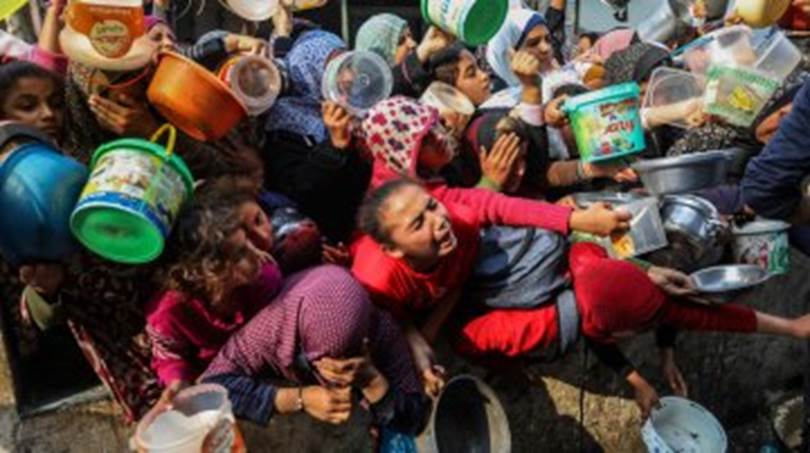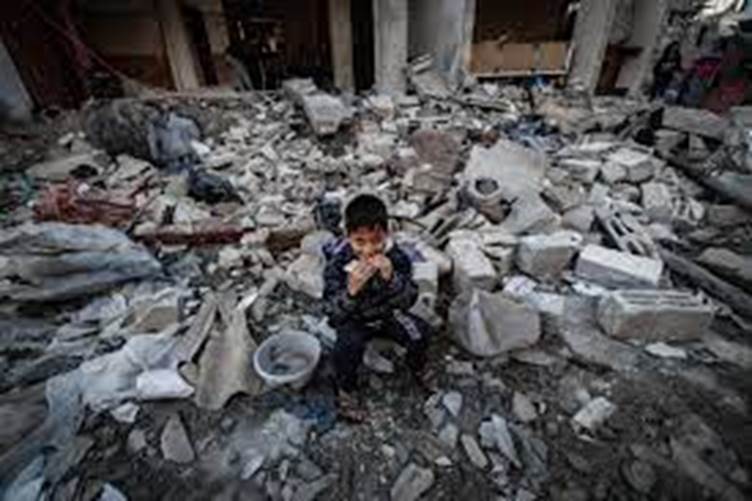
Palestinians in Rafah are desperate for food but aid is drying up -Ahmad Hasaballah/Getty Images
Children Eat Rotten Food, Adults Hunt Cats: Famine Is Coming for Gaza
In the wasteland of al-Mawasi encampment in Gaza, hunger is everywhere. It is in the handfuls of dirty flour that mothers try to knead to make bread for their children. It is in the fires, stoked with plastic bottles, which produce nothing but choking black smoke. It is in the children who no longer play but lie around, exhausted. It is in food that is rotten and makes you sick but is eaten just the same. It is in Camellia Subeh’s breast, which no longer produces milk for her baby son.
“My other sons keep saying, ‘Mum, I’m dizzy, I have a headache,” said the mother of five, sitting outside a shelter she built on the mud from scraps of plastic and wood.
Subeh and her children left their home in northern Gaza weeks ago on the instructions of the Israel Defense Forces (IDF), which dropped leaflets telling people in their area to come here, to three square miles of rubbish-strewn dunes and pockmarked fields with no tents, food, water supply or any infrastructure to support the displaced.
The IDF says this is a safe area. Perhaps it is safe from the bombs that have destroyed Gaza’s cities and towns. But not from hunger, diseases or thirst that will kill just the same as a bullet will. “This place is like a desert, all sand,” Subeh said. “We are so tired.”
The Palestinian death toll in the Gaza Strip after nearly three months of war stands at 21,672, with more than 55,000 wounded, the territory’s Hamas-run health ministry said on Saturday. Now Gaza also faces famine. That is the bald assessment of the integrated food security phase classification (IPC) initiative, a UN-backed body that sets the international standard that determines the severity of food crises.
The IPC estimated, in a report this month, that the entire population of Gaza faces crisis levels of hunger. A quarter face “ catastrophic conditions ”, the highest level of food insecurity, where there is an “extreme lack of food, starvation and exhaustion of coping capacities”.
This, the IPC believes, is likely to lead to famine in several areas in the north and center of Gaza by February. Famine is a technical specification that aid agencies are careful about using: it is declared when an area has at least 20 per cent of households facing an extreme lack of food, at least 30 per cent of children suffering from acute malnutrition, and two people for every 10,000 dying each day due to outright starvation or the interaction of malnutrition and disease.
In Gaza, this is happening not because of a drought or because crops have failed, but because of the war. Before it began, about 150 to 180 food lorries entered Gaza every day. Since the end of the “humanitarian pause” a month ago, only about 30 do so. They are blocked by the Israeli bombardment , the fighting on the ground, and by restrictions and inspections on the border with Egypt, which are imposed by the Israeli and Egyptian authorities.
“We’re very far from giving a humanitarian response to the people of Gaza,” said Nicholas Papachrysostomou, emergency coordinator for Médecins sans Frontières in Gaza, who had just returned from five weeks there. He added: “No one is feeding themselves well.”
When aid trucks do make it through, they are mobbed by desperate civilians, who try to climb on board to take what they can. Israel, which has denied blocking food aid from entering Gaza, claims that Hamas is stealing supplies but has provided no proof.
“There’s a risk of a complete breakdown of law and order because people are desperate,” said Jason Lee, Save the Children’s country director in the Palestinian territory, adding that many families had started to ration food, to try to stretch out what few supplies they have.
Gaza is facing famine as aid dries up
Barely any aid has reached the people in the north of Gaza, who are separated from the rest of the population by the fighting. Phone signals are cut off and large swathes of Gaza City, with its once-bustling beachfront restaurants, are destroyed.
No one knows how many people remain in the north, but charities estimate that it could be in the hundreds of thousands. They have nothing. On Friday, the UN said aid staff had been shot at by Israeli soldiers when trying to return from a rare trip there. The IDF did not respond to a request for comment.
Aid agencies who have visited the area say starving civilians have taken to hunting down stray cats and dogs on the street for food.
On Friday, Israeli tanks pushed deeper into central Gaza amid heavy bombardment, which according to the Hamas-run health ministry killed more than 100 Palestinians, many of them in urban refugee camps.

A child eats in the rubble of Rafah - AFP
More than a million have fled south , to places such as al-Mawasi, which stinks of rancid rubbish and toxic smoke, and where there still is never enough food. Subeh’s children have scabies, diarrhoea and lice. She became separated from her husband on the way there, and does not know where he is.
Around the encampment, people try to make fires with whatever they find: bottles, crates, anything plastic that burns. The wood is long gone. There are no clean lavatories, few have soap. Disease thrives. The air buzzes with the constant sound of drones and warplanes.
To live in Gaza today is to be constantly looking for food. No one has enough. Most markets are closed and food is sold as it becomes available: some days you can find eggs but not lentils, or salt but not potatoes. Money can only get you so far, and prices are absurd: a kilo of rice costs £8, when you can find it. Middle-class people also go hungry. Banks are closed and many have spent the cash they had with them at the beginning of the war; 85 per cent of the population is displaced.
In al-Mawasi, most people have nothing. A few have cans: beans or sometimes tuna, given to them by aid organizations. But there is never enough to go around, and often people are given just one or two cans per family every few days. Instead, they eat whatever they can find, even if that food is rotten, and makes them vomit — rancid eggs, moldy bread.
In the space between two makeshift tents, 13-year-old Muhammad al-Yaziji was heating up a tin of beans that his younger siblings had begged from people nearby. He fled here with his younger brother and two little sisters — the youngest is just a baby, less than a year old — after their house was destroyed. Their mother was killed in the Israeli bombardment and they lost their father in the chaos.
“I took my siblings and we went to Rafah on foot. My little sister was crying, wanting us to carry her,” he said. “When we came to Rafah, we spent two days in the street. Then I put my siblings on the sidewalk and told them to stay there until I looked for a place for them. I found a place and sat there, but sewage filled the place, and some people helped me by making a tent.”
A few months ago he was at school. Now he has to be a parent to his siblings. “They always tell me they’re hungry, and I don’t have anything to feed them,” he said. “My little sister, I cannot provide milk and nappies for her. I feel that this burden is very heavy for us. I sleep thinking about how I will feed them. We became like beggars. We were not like that.”
New mothers and children are among those suffering the most from the lack of food. Iman al-Masry, 29, gave birth to quadruplets this month in the central district of Deir al-Balah. There was no space in the hospital, one of just nine still partly functioning in the strip, so she had to leave the day after she gave birth by caesarean. Now she sleeps on a thin sponge mattress in a school along with other displaced people: one of her babies, Mohammed, is very weak and remains in the hospital, while Tia, another of the quadruplets, has syphilis.
“We have not been able to protect them since they were born, I just wipe them with a towel. I was dreaming of the day they were born, how we would celebrate them,” she said. “My husband goes every day to find something for me to eat so that I can breastfeed my children. For days now, the milk in my chest has been very little. I eat anything I can find, a biscuit from the aid supplies or cheese and bread, but I always feel tired and exhausted.” – The Times

